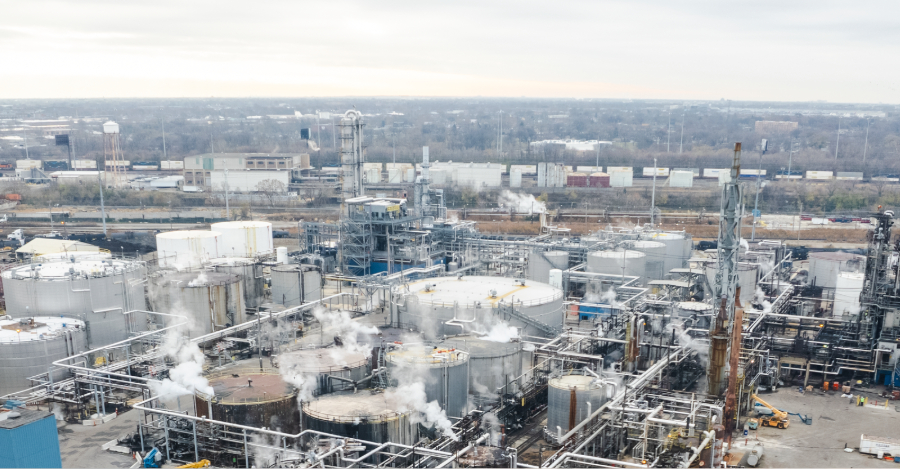“The Air We Breathe,” published by the Cicero Independiente and MuckRock, has been chosen as the 2024 winner of the Victor K. McElheny Award for local and regional journalism.
During this yearlong investigation, the two nonprofit newsrooms installed air quality monitors in volunteers’ homes in Cicero, Illinois. They found that Cicero, next to a 101-year-old Koppers coal tar plant, had air quality consistently worse than surrounding areas, and worse than government regulators reported. The team also found Koppers, still a permitted polluter in the area, had a 50-year record of violating state and federal environmental regulations.
Communicating with the community in English and Spanish, collecting their stories, and sharing their findings about the air quality, this team of reporters conducted a thorough investigation in the public interest.


“‘The Air We Breathe’ is a stunning storytelling hybrid: it’s a classic investigative series, rich with methodology, data and digging; it’s also a powerful community outreach project, built with participation and buy-in and captured in inclusive, welcoming visuals that didn’t just sit on a website, but became part of a conversation on Cicero’s streets,” said Jeff Delviscio, a McElheny Award Judge. “And all of this was done by a small, and clearly scrappy, team of journalists, no doubt on a tiny budget. It’s local journalism made for, and built by, locals. The team should feel incredibly proud of what they’ve accomplished.”
Credit for “The Air We Breathe”
Reporting and writing for “The Air We Breathe” was by Derek Kravitz and Dillon Bergin of MuckRock, Luis Velazquez of the Cicero Independiente, Richie Requena and Jorge Martinez for the Cicero Independiente and Stephana Ocneanu and Glendalys Valdes of Northwestern University’s Medill School of Journalism. Dillon Bergin of MuckRock and Karen Wang of Columbia University’s Brown Institute for Media Innovation conducted data analysis for the series. Graphics and illustrations were created by Brian Herrera for the Cicero Independiente and MuckRock and Kelly Kauffman of MuckRock. Jesus J. Montero shot drone footage for the Cicero Independiente and Kelly Kauffman of MuckRock edited the footage. Derek Kravitz of MuckRock and April Alonso, Irene Romulo and Luis Velazquez of the Cicero Independiente served as editors for the series. Sanjin Ibrahimovic of MuckRock installed air quality sensors at volunteers’ homes.

Support for this project came from the Data-Driven Reporting Project, which is funded by the Google News Initiative in partnership with Northwestern University’s Medill School of Journalism; the Rita Allen Foundation; the Reva and David Logan Foundation; the Healthy Communities Foundation; and the Donald W. Reynolds Journalism Institute at the University of Missouri.
“This series demonstrates the critical importance of local science journalism, in which reporters take the time to explore city environments often ignored by others, illuminate health threats, and provide information that is essential to protecting the health of such communities,” said Deborah Blum, Director of the Knight Science Journalism Program.
“We’re honored to give this award to ‘The Air We Breathe’ and to recognize the other excellent reporting by the finalists for the Victor K. McElheny award.”
The Benefits of Partnership in Local Science Journalism
Reporters from the Cicero Independiente and MuckRock shared the benefits of partnering – pairing the strengths of the two newsrooms resulted in investigative journalism that would have otherwise been impossible.
Derek Kravitz of MuckRock shared, “We were lucky enough to have an ambitious and innovative local newsroom partner, the Cicero Independiente, that is dedicated to the community and committed to answering questions about the public health impacts of air pollution.”

“Many residents have expressed their concerns about the ongoing air pollution problem…we found it critical to investigate. Working with MuckRock created a space for us to learn and grow when it came to requesting documents through the Freedom of Information Act, approaching town officials and incorporating data into our stories. This project would not be possible without them!” said Luis Velazquez of the Cicero Independiente.
Kravitz went on, “Environmental accountability journalism of this kind — using off-the-shelf sensors installed on volunteers’ homes, data journalists to interpret the readings with the help of outside experts and repeated requests and subsequent reading of thousands of pages of air emission and regulatory paperwork filed with county, state and federal agencies — is extraordinarily labor-intensive and costly. For the Independiente, a bilingual newsroom of just three full-time staffers and a stable of freelancers, to undertake this work without an outside partner is a rarity.”
Honorable Mention to Four Finalists
The McElheny Award received an extensive collection of submissions from around the United States, representing dogged, high-quality journalism in service to local communities. In addition to the winner, the McElheny Award recognizes four finalists (in no particular order):
Cradle of Doubt (series), an investigation by the Boston Globe, examines the consequences (often tragic) of co-sleeping with infants. While investigating the legal repercussions facing parents after an infant dies as the result of co-sleeping, they also find ineffective messaging warning parents about the practice and raise concerns that high-tech baby monitors will give parents false reassurance that sleeping with their baby is safe.
New analysis shows 740 chemical sites in Louisiana are at risk from storms. Are they ready? Delving into this question, the Times-Picayune and NOLA.com report that nearly a quarter of Louisiana’s population lives within a mile of a site that houses toxic chemicals and is at risk for extreme weather. With no state or federal regulations requiring facilities to prepare for that extreme weather, residents and experts fear common sense safety precautions won’t prevail until after a massive disaster.
For their series Colorado River in Crisis, the Los Angeles Times travels along the Colorado River watershed from the Rocky Mountains to the dry delta in Mexico. Humans are pulling more water from the Colorado River than it can sustain, and it’s shrinking. This series illuminates the far-reaching impacts of the declining river and the need for solutions that match the scale of the crisis.
In Buried Secrets, Poisoned Bodies, a Searchlight New Mexico reporter investigates a rumor about an autopsy revealing a woman with an unusually high concentration of plutonium in her liver from her hometown Truchas (downwind from Atomic detonation at Trinity Site). She identifies the woman and learns that the autopsy was performed without the consent or knowledge of the family. The article opens conversations about consent, generational impacts of radiation exposure, and the cause of this unusually high concentration of radioactivity.
The 2024 McElheny Award
Named after the Knight Science Journalism Program’s founding director, the Victor K. McElheny Award was established to honor outstanding coverage of science, public-health, technology, and environmental issues at the local and regional level. The winning team will receive a $10,000 prize. The winners will be honored at a ceremony held in Boston later in 2024.
The Knight Science Journalism Program extends a special thanks to the 2024 McElheny Award jurors: Erika Check Hayden (Director, Science Communication Program at University of California Santa Cruz); Jeff DelViscio (Senior Multimedia Editor, Scientific American); Sujata Gupta (Social Sciences Writer, Science News); Ashley Smart (Associate Director, Knight Science Journalism Program at MIT). The Program also extends warm appreciation to the award’s screeners: Jess Hamzelou, Kai Kupferschmidt, Chikezie Omeje, Dyna Rochmyaningsih, and Peter Whoriskey.
The McElheny Award is made possible by generous support from Victor K. McElheny, Ruth McElheny, and the Rita Allen Foundation.
“We’re honored to give this award to ‘The Air We Breathe’ and to recognize the other excellent reporting by the finalists for the Victor K. McElheny award.”
Deborah Blum, Director, Knight Science Journalism Program
2024 Victor K. McElheny Award Honorees, Complete List
Winner
The Air We Breathe (series) by Derek Kravitz, Dillon Bergin, Luis Velasquez, April Alonso, Kelly Kauffman (The Cicero Independiente and MuckRock)
Finalists
Cradle of Doubt (series) by Deirdre Fernandes, Liz Kowalczyk, and Patricia Wen (Boston Globe)
New analysis shows 740 chemical sites in Louisiana are at risk from storms. Are they ready? By Tristan Baurick and Jeff Adelson (The Times-Picayune and NOLA.com)
Colorado River in Crisis (series) by Ian James, Molly Hennessy-Fiske, Sean Greene, Albert Brave Tiger Lee, and Los Angeles Times Staff (LA Times)
Buried Secrets, Poisoned Bodies by Alicia Inez Guzmán (Searchlight New Mexico)





Leave a Reply